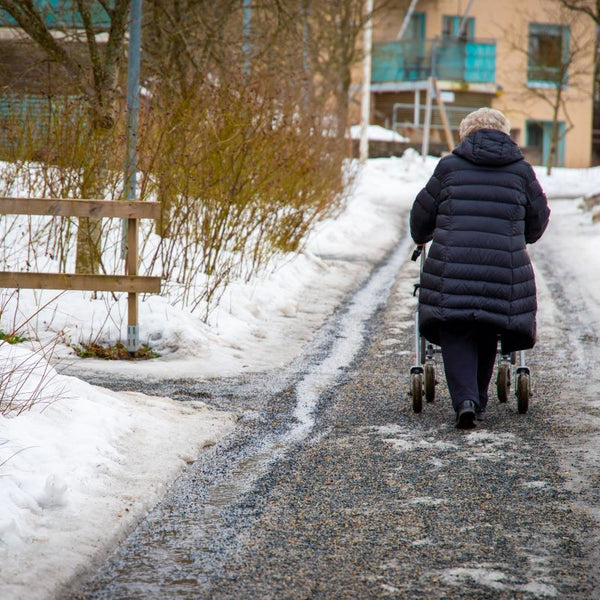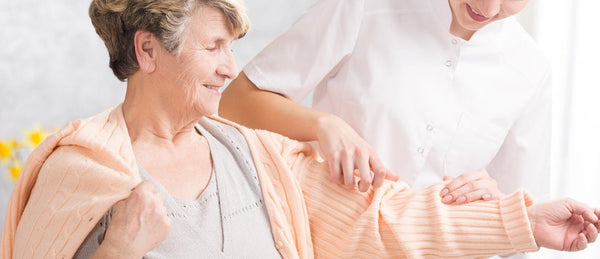It's tough for anyone to be dependent on other people to fulfil basic needs, but as we age, we might lose our independence due to mobility issues and other health conditions. As elderly loved ones lose their independence, it can be tempting to take over some of the tasks they did themselves.
Understandably, this could be because of the uncertainty around the safety and independence of elderly loved ones. For example, Dad can no longer drive safely, which means he can't get around on his own; Mum keeps leaving the oven on, so now she has lost the confidence to bake as often as she used to. However, instead of taking over tasks for them and worrying about their safety, you can promote their freedom by maintaining a balance between helping them and supporting them to do things on their own confidently.
Importance of promoting independence in old age
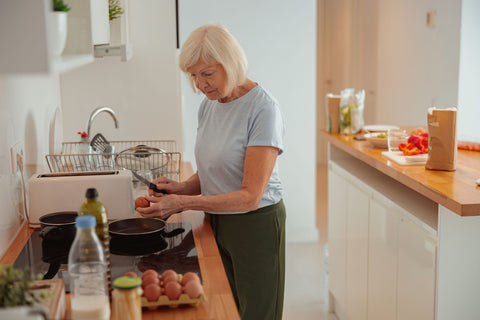
Promoting independence among the elderly is important for several reasons. Firstly, it helps them boost their confidence and self-worth, allowing them to continue making informed decisions and participate in activities they love.
Secondly, it has a practical impact on their physical and mental well-being. By encouraging independence, older adults are less likely to feel like a burden on loved ones. Their ability to perform tasks independently can help maintain physical health, balance, and strength.
Moreover, promoting independence in the elderly helps to fight social isolation and loneliness. They can join social groups like book reading groups, meet others, build connections, and spend time with family and friends, significantly improving their quality of life.
Loss of independence in older adults
Plenty of factors can be responsible for the loss of independence in older adults. It can often occur from psychological, social, physical, and mental challenges. Some of the most common reasons behind the loss of independence are:
Physical limitations
As people age, they may face physical challenges that affect their mobility. Arthritis, joint pain, and muscle weakness are common issues that can restrict mobility and make it challenging for older adults to move around comfortably. Also, older adults may experience hearing loss or vision impairment, making it difficult for them to navigate around their surroundings.
Health concerns
Chronic medical conditions, such as arthritis, diabetes, heart disease, and respiratory issues, can have a significant impact on an older loved one's mobility and overall well-being, often restricting their ability to complete day-to-day tasks independently. Cognitive decline, caused by conditions like dementia and Alzheimer's disease, can affect memory, decision-making, and problem-solving abilities, which can lead to a loss of independence.
Changes in living arrangements
Experiencing the loss of a spouse or partner can have a deep impact on one's emotional state. It can lead to distress, isolation, and loneliness, which may cause a lack of interest in social interactions and activities. Changes in the surroundings of older adults might occur when they relocate to care homes or a relative's place. These changes can overwhelm them as they might affect their sense of familiarity and freedom, making them feel vulnerable.
Loss of confidence due to falls
It’s a disturbing fact that 1-in-3 people over 65 experience a fall at least once a year. These falls can cause serious physical injuries, leading to a loss of independence. Even if severe injuries don't happen, falls can result in damage to your loved one's confidence, mental well-being and independence.
How can you encourage independence in older adults?
If your elderly loved one is going through physical or psychological changes, it might be daunting for them to complete everyday tasks independently. However, encouraging them to be more independent can give them a sense of purpose and freedom, ultimately pushing them to have the confidence to finish tasks independently. Read on to find out more about promoting independence in older loved ones.
Create a balanced schedule
Planning a routine with your elderly loved one can help ensure that important tasks, such as taking medication or attending appointments, are not forgotten. A known routine can help balance handling responsibilities and fun activities for your loved one. You can let your them create a schedule and assist whenever they need your help. For example, if they are not able to drive to their medical appointments, you can find out about the most convenient public transport options with free or discounted travel options or take time to drive them yourself. This will allow you to catch up with them as well. Also, plan a day in between for them to relax and enjoy the activities they love.
Find activities they are interested in
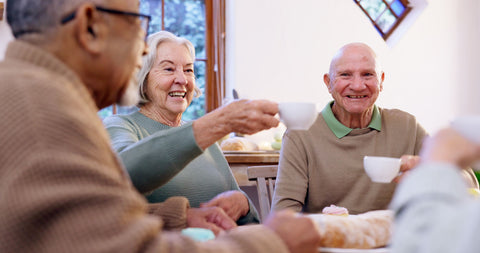
As people age, it is common for them to feel isolated and depressed, particularly if they are losing their independence. To help loved ones feel more independent, plan and arrange social activities they are interested in, allowing them to maintain meaningful relationships and fight feelings of social isolation. You can discover new activities for them to join or volunteer for a cause they believe in that can add a goal to their life. For example, joining a church group can help the elderly meet new people, learn new activities, and be part of something purposeful.
In later life, physically they might not be able to move quickly, but they can try sports for the elderly that can be easily tailored to their needs and abilities. These activities can help them improve their strength and balance.
Communicate about their choices
Maintaining independence is very important for older adults. However, sometimes, they might feel helpless and depressed when they are unable to make their own decisions. Therefore, giving them plenty of choices is important to promote their independence. Consult them about their preferences and goals and involve them in discussions regarding their daily routines, fun activities, and healthcare decisions. You can present meal planning options, clothing choices, and recreational activities and support their decision-making process. By offering choices, you help them maintain control over their lives and enhance their overall sense of independence and well-being.
Safety modifications at home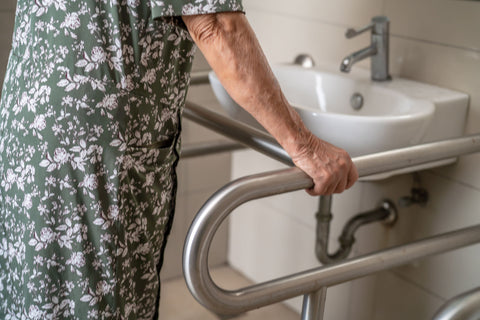
According to Age UK, more than 2 million people in England over 75 live alone, and their safety is often a worry for loved ones. Many older adults and their loved ones often worry about having a fall, especially if they have experienced a fall before. This fear can drive them to worry about carrying out simple tasks such as showering and walking. However, making safety modifications by thoroughly assessing their home can keep them safe while encouraging them to complete these tasks without assistance.
Ensuring that any rugs are carefully taped so they won't slip and loose cables are not left trailing where they could be a hazard is essential for safety reasons. Consider installing handrails in hallways and near staircases and install grab bars in the bathroom near the toilet, shower, and bathtub to assist with stability and prevent falls. Adding non-slip mats can also help prevent falls in the shower and bathtub.
Explore using remote monitoring technology like motion sensors, fall detection system and emergency buttons. These tools can alert family members or caregivers in case of emergencies.
Peace of mind with a GPS personal alarm
Getting a personal alarm can be an excellent solution for older loved ones with a history of falls or just as an additional layer of peace of mind for the elderly and their loved ones.
Simply pressing a button on the monitored personal alarm from TakingCare will connect your loved one to a 24-hour emergency resolution team.
They will speak to your loved one and can arrange for a nominated person to be contacted, or other emergency assistance can be arranged if needed. Some personal alarms include fall detection technology so an alert can be raised even if the person is unable to press the button.



